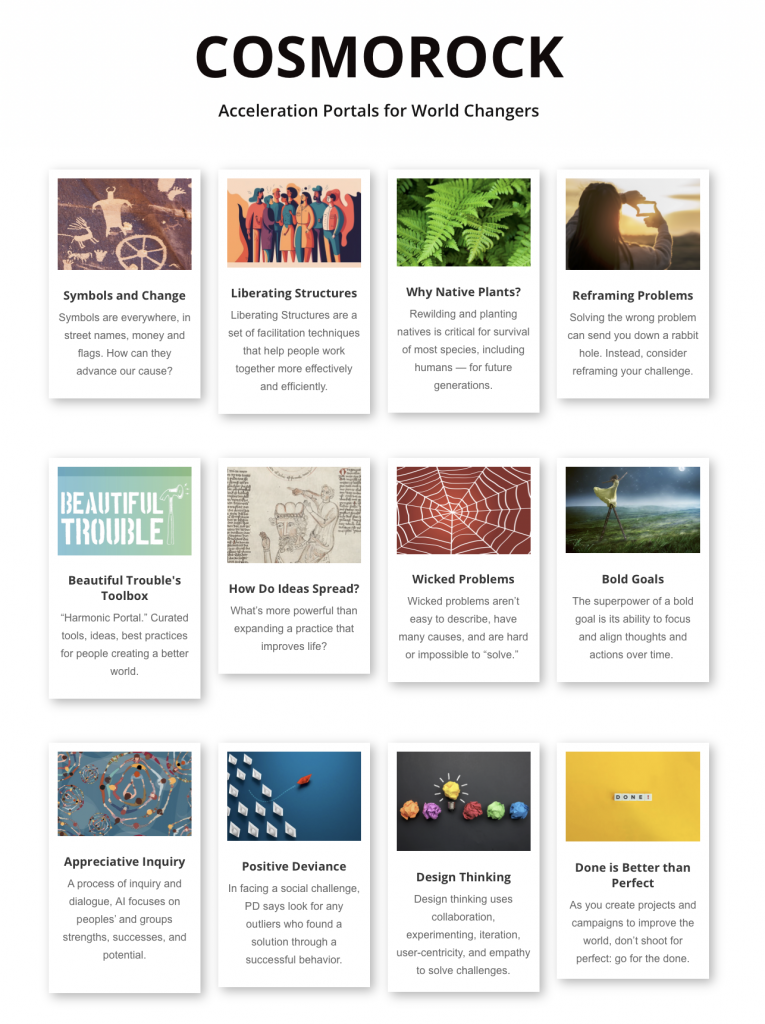Click HERE for “Reframing” Portal at Cosmorock.org
By Tom Peterson
The mere formulation of a problem is far more essential than its solution, which may be merely a matter of mathematical or experimental skills. To raise new questions, new possibilities, to regard old problems from a new angle requires creative imagination and marks real advances in science.” — Albert Einstein.
Before you spend energy looking for answers, make sure you have a question worth asking. How you frame your challenge governs what kind of solutions you’ll get. A great answer to the wrong question is not as good as a partial answer to the right question. It can also set you back as you pursue less valuable goals. To reframe, step back and look at a situation from different angles, in different lights, through different lenses. Here are some techniques that may help:
- Flip from the negative to the positive. A well-known reframe is to mentally shift from having a problem to a having a challenge or even an opportunity. The new perspective creates a different attitude with very different solutions. Is the glass half empty? Half full? Or is it simply a container that can be refilled whenever you want?
- Spend time thinking about the prompt, or question. How you frame your question will determine how you the kinds of “answers” you get. Start by asking what you want the question to accomplish. For example: If we were to start with a clean slate, what would we do? Who else wins if we’re wildly successful, and how could we partner with them? How can we be the best in the world at…?
- How might we… ?
- What if… ?
- What might be a better way?
- In an ideal situation what…
- If you could wave a magic wand what would you…
- What would you wish in 10 years?
- If money were no object…
- Frame-storming. Instead of starting with a session brainstorming solutions to a problem, spend start by exploring different ways to frame the challenge, or what Stanford University’s Tina Seelig calls “frame-storming.” Group process facilitators know that working on the right questions is key to getting to good outcomes. Seelig suggests that if you brainstorm about how to plan a birthday party you get a certain set of results, but if you ask, “How do we plan a birthday celebration?” you’ll get a different kind of ideas. And asking how do we make that day memorable or special will create yet another set of ideas.
 Ask Why? You may think you know what you want to accomplish, but why do you want to do that? Like the annoying toddler, ask why. Then ask why to that answer. Again and again. As many times as it takes. Many whys in, you may discover your best challenge to work on.
Ask Why? You may think you know what you want to accomplish, but why do you want to do that? Like the annoying toddler, ask why. Then ask why to that answer. Again and again. As many times as it takes. Many whys in, you may discover your best challenge to work on.
- Reframe your big challenge into a set of smaller challenges. Most important challenges are complex, and trying to solve a big one in one big bite can be overwhelming. Can your challenge be reframed into a number of smaller challenges? In the spirit of kaizen, or small incremental improvements, ask what are a bunch of small things that can happen to move you toward the goal? Often, groups can think of small solutions—some can be put into practice immediately, without getting anyone’s permission. This can create momentum and open new possibilities.
- Think of limitations as aids to creativity. With creativity and perseverance you can do a lot with little. Innovators are almost always underfunded relative to their challenge. Consider how having limited resources, while inconvenient, can actually help you move mountains with small inputs.
- Challenge authority. It’s been said that sacred cows make the best hamburgers. What if the grown-ups who run everything are completely wrong? Often, a great starting point is to understand that the experts, the guilds, the establishment are clueless. What assumptions that they hold sacred should be challenged?
- Make a plan for the opposite outcome. A friend of mine says: think of the stupidest thing you can do and then do the opposite. Re-frame your challenge by thinking of ways to get the exact opposite outcome you want. The rowdy and fun Liberating Structures TRIZ exercise asks a group to list everything they can do to “achieve the worst result imaginable with respect to your top strategy or objective.” So if you’re wanting to improve your group’s internal communications, list ways to have the worst communications: punish those who speak the truth, especially the bad news; encourage water-cooler gossip; leaders keep their plans tight to the chest, and so on.
 The group then lists ways they are actually doing (in any shape or form) some of these bad ideas and finally shifts to improvement strategies.
The group then lists ways they are actually doing (in any shape or form) some of these bad ideas and finally shifts to improvement strategies.
- Ask others how they would frame the question. Don’t just ask the same old people, add diversity to the process. Ask people from different parts of the organization, ask the stakeholders, the end-users, intended beneficiaries what questions they would ask. You can even open source your framing online or in other ways.
- Look at the larger picture. Zoom out. Then zoom out farther. And again. What are you actually trying to achieve? A common limitation happens when a group tries to solve a problem, when in fact they may be really wanting or needing to solve a different problem. Step back a few clicks. What is the context? Don’t hesitate to ask bigger questions.
In his inaugural address, John Kennedy challenged citizens to reframe how they relate to their government and the nation: “…ask not what your country can do for you — ask what you can do for your country.” A citizen answering the first question may want to quit paying taxes but the second question may inspire her to improve the world by volunteering with the Peace Corps.
See also: Reframe the problem, what are you really trying to accomplish?
Reframe the problem, what are you really trying to accomplish?


[…] See also 10 ways to reframe problems […]